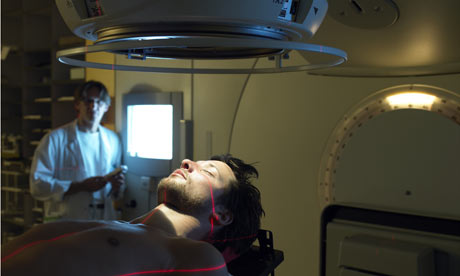
Last week, the centre-right thinktank Policy Exchange highlighted what has been known for a long time – that the survival rates for cancer in the UK are below the European average. In its report, the Cost of Cancer, it estimated that by 2020, 71,500 lives could be saved if the NHS was able to match the best countries in Europe, including Finland and France. "We do have to be careful, because the data is quite old, and different countries' data cannot be absolutely compared," says Sarah Woolnough, director of policy at Cancer Research UK. "But we are clear that our outcomes are still not as good as the best in Europe." The big question, then, is how can we close this gap?
According to Woolnough, one of the main problems is that we diagnose cancers later. "People present to their GPs later, because there is still a low awareness of symptoms, so we need to improve awareness. There could also be a typically British attitude coming into play, of not wanting to bother the doctor."
Meanwhile GPs, as "gatekeeper" to cancer services, need better briefing and diagnostic resources. "It could be that some GPs are not as up-to-speed on symptoms and referral guidelines as they should be," she says. Professor Gordon Rustin, director of medical oncology at Mount Vernon Cancer Centre in north-west London, agrees: "My specialism is cancer of the ovary, and in some cases patients have had symptoms for many months – which can easily masquerade as other less serious illnesses – before anything is done." He continues: "GPs don't have access to diagnostic tests as much as they would like. In some places in Europe, you can get a scan at the drop of a hat."
Interestingly, the UK spends more on cancer research than any other country in Europe. Only last week a new prostate cancer "wonder drug", Abiraterone, was shown by scientists funded by Cancer Research UK and working at the Institute for Cancer Research at London's Royal Marsden Hospital, to stabilise or shrink tumours for an average of almost six months.
It could be on the market as early as next year. But whether you'll be able to get it on the NHS remains to be seen, as we spend significantly less on treatment than other countries. In England 5.6% of the healthcare budget is spent on cancer, whereas France spends 7.7%, and Germany 9.6%. In fact, says Nick James, professor of clinical oncology at the University of Birmingham and consultant at the city's Queen Elizabeth Hospital, "The amount spent per patient is lower than the northern European average by some way – about 40%, which is not a subtle amount."
There is work in progress to redress our cancer survival deficit. The NHS Cancer Plan was launched in 2000, with increased funding, to improve diagnosis, treatment and survival rates. And as part of the more recent Cancer Reform Strategy the government has, among other things, set targets to improve screening and access to radiotherapy and chemotherapy so that the UK becomes comparable with international standards, by 2012.
"I think [Britain's lower survival rates] has, historically, had more to do with the health service not prioritising cancer patients and I think this still exists in chunks of the health service," says James. "Since the cancer plan came in, there probably has been increased survival because knowing how our own trust works, when you put targets in place, you do everything you can to hit them."
However, he says, the targets are not that ambitious. "Say your GP was worried about your symptoms – now, you will be seen by a specialist within two weeks, but then it might be 30 days before your treatment is decided, and another 30 days to start it. Which isn't great and, presumably before, people weren't achieving even that.
James concludes the quality of cancer care in this country remains "very patchy – with late and slow delivery of treatment and poor access to drugs, chemotherapy and radiotherapy – and this continues to have an effect."

